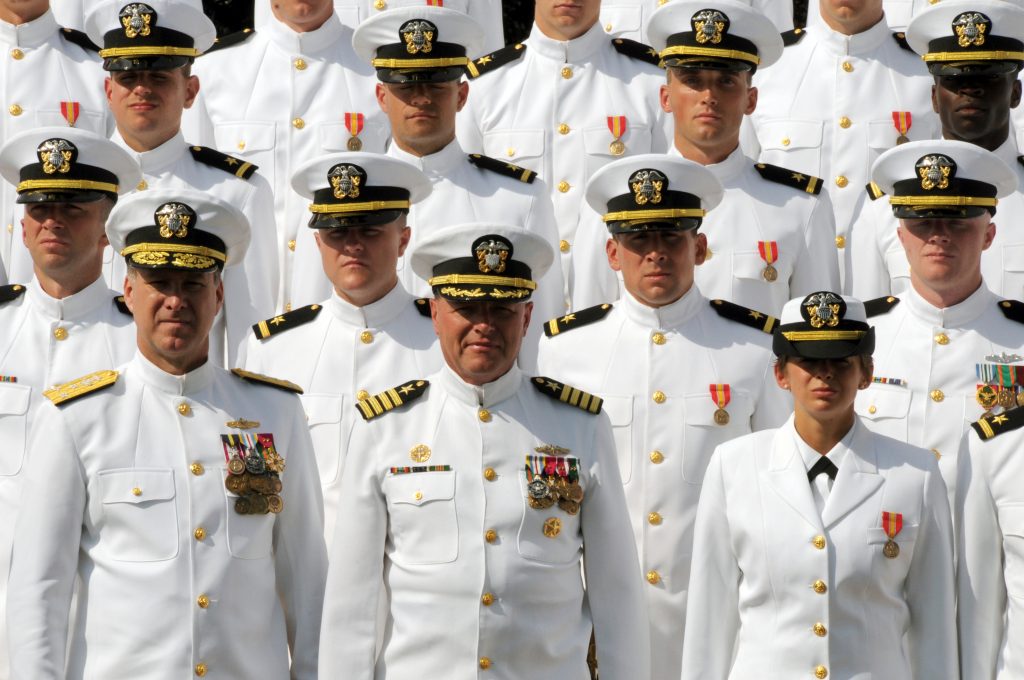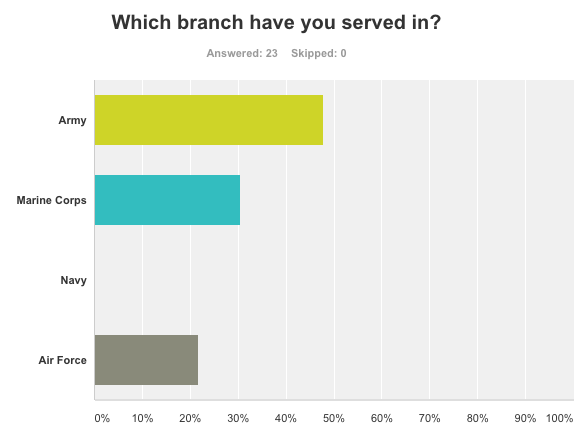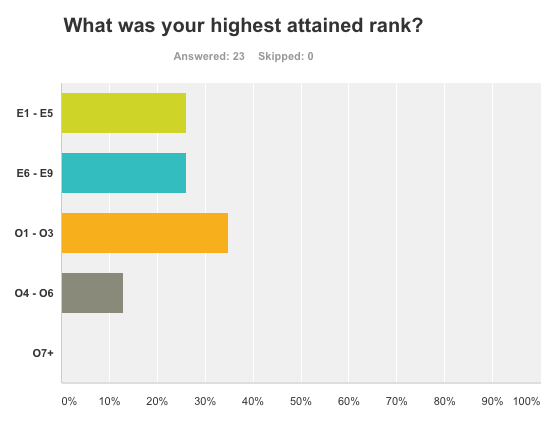
By Charles Bausman
We recently published some surprising statistics on the evolving ratio of officers and enlisted in the United States military. Over the past 15 years, the military has grown it’s officer corps, decreasing the ratio enlisted to officers by a total of 12%.
Compared to previous conflicts, the ratio has is even more dramatic. The nature of past conflicts which the U.S. has been involved in, as well as the implementation of the draft, may have altered the nature of our military manpower. Regardless, a trend is clearly observed in the enlisted to officer ratio… The number of officers is on the rise.
What could be the explanation for this change? Our best hypothesis was due to the rise of technology requiring officer supervision or employment with less enlisted troops involved, and the increase in commands worldwide which are generally officer heavy.
What we didn’t know was whether NCO’s and Officers are granted less responsibility than they were in past years. We asked you to complete our survey to provide your experiences and seek an explanation for the change.
The survey results provided mix results. Most seemed to agree that a higher degree of micro-managing exists that pushes the decision-making process up the chain of command. The increase in the number of commands (and associated staff positions), as well as the demand for interagency work for officers, may be a factor as well.
For NCO’s, most stated that their responsibilities have not necessarily decreased, but the level of supervision from superiors for small tasks has increased. Several respondents complained of low pay and one-sided non-judicial punishment, which may play a role in retaining quality NCO’s over a twenty to thirty-year career.
Responses are listed below.

What do you attribute the decreasing enlisted to officer ratio to?
I think there’s more uncertainty in the higher ranks now that most of our military engagements are focused more on preventing terrorism and not full scale military engagement with large combat units as in the past.
Military officers get paid well, so they tend to stay in for a longer period of time. Enlisted folk get paid shit – and they know they can make more money on the civilian side.
In the tables, you’re comparing the Army today to The Civil War, WWI, WWII, and Vietnam. Those were major conflicts, and times when the Army was huge. Though the Army is technically at war today, it cannot be classified as a major conflict. Consider however, that if the Army had to expand rapidly in order to fight a major conflict, it would need a trained/ready cadre of leaders. It takes a great deal of time to train officers, and senior NCOs. In the grand scheme of things, it is much easier to train and provide ready soldiers. During times of minimal conflict, it makes sense to retain a smaller ratio of officers to enlisted, because the Army has to be ready to react to a contingency.
Joint service requirements and the blend of civil, political an diplomatic factors involved in how the military of today operates.
Any number of potential reasons: Increased operations with host nation forces who do not have a strong NCO culture in their own forces, and therefore, do not have the necessary culture to collaborate with American NCOs; more trust given to officers in general due to the training it takes to become an officer compared to the training of junior enlisted and NCOs; the enlisted promotion process reduces the ability for enlisted to get promoted, decreasing the incentive to stay in; enlisted are often subject to NJPs that officer’s wouldn’t be, which can kill a career, reducing the incentive to stay in; increasing billets at HQs and other major commands that require officers to fill compared to traditional unit structures like a battalion; units like Special Purpose MAGTFs that might have a higher requirement for officers.
Joint HQ/Combatant Command HQs, redudant and bloated HQ organization, less “manual-labor” requirement with increased automation/technology-aided processes
I think just a general downsizing in force. This seems to happen between every period of conflict. Also, there are more tech jobs being created which need officer level staffing. It will change when the next debacle beings and they need more enlisted to throw at areas of conflict.
Increased ability to attack through aviation means equals more officer’s and less total boots on the ground.
I’d attribute the ratio change to two things. Firstly, the rise of highly technical fields such as cyber and signal, which is networking focused now; those ranches still absolutely need NCOs, but the availability of junior enlisted billets is lower because of the complex nature of the systems. The second factor is the reduction in force size, the Army is ordered to contract, and it does but not proportionately across all ranks. By retaining an officer base, as well as senior NCOs, they retain the ability to rapidly expand when called to do so. The enlisted population can be grown faster than the officer population. Im not saying an officer is any more valuable than an enlisted Soldier, but the organization can in process and train the enlisted population faster. I’d also imagine a further premium is placed on hard skills officers such a rotary wing pilots, if that population isn’t maintained it couldn’t possibly be grown at a rate anywhere near fields like The Infantry or Armor.
The increasingly “corporate business” focus of the armed forces, and a lack of trust by officers to delegate tasks to NCOs
Technology = higher education “needed” to operate equipment, more soldiers able to commission to officer after meeting education requirements (GI Bill effect)
Are NCO’s entrusted with less responsibilities now compared to when your career began?
Yes, especially the Senior Enlisted.
I would say yes because when I was in the Army NCO’s were in charge manned strategic communications facility that supported the Army and DOD in general however with less line units not and TDA units many NCO’s are not mostly over line units or combat type units and manage troops over equipment and facilities.
No – they are still the backbone of the Army. There is no substitute for a good NCO. The trouble is that the last 15 years of war has put a tremendous stress on the NCO corps. The quality of individuals that become NCOs is mixed.
I’ve been retired for 3 years now. I had much more responsibility as a SNCO than when I began my career in 1991. That was due to the force drawdown. It was do more with less.
Yes, though it depended on who the NCO was. There was also an increase in the number of NCOs in units and more interaction with officers.
Debatable, but definitely more minute supervision of basic operational tasks by commissioned officers.
It completely depends on the unit. The best units have entrusted their NCOs with MORE authority than when I enlisted in 2002.
NCOs have more responsibility in combat zones and less responsibility in garrison. This is s a problem that needs to be addressed.
About the same, but it seems we have more officers in our MTOEs.
Are officers entrusted with less responsibilities now compared to when your career began?
No, they have taken on tasks normally reserved for SNCO’s.
NO – officers need to know their jobs right out of the gate. There is no longer a learning curve, when it comes to budgets, accountability, equipment, etc. Also, the myth that all NCOs are somehow infallible has been debunked over the last 15 years. Officers need to come in knowing their jobs.
There is a greater demand for staff officers. If you are commanding the responsibility is greater.
I don’t know what my officers did when I first joined, but by the end I was convinced they were working too hard.
It depends. Decision-making is fleeing up the chain of command on both the enlisted and officer side.
Depends. They are pushed to take a more micromanagerial role. The Army has become a seriously risk averse environment in the last 16 years. With that comes more officers to essentially control all aspects of operations.
Officers now are performing tasks that were previously considered “NCO business.” Unfortunately those officers generally lack the experience and direct knowledge to perform those tasks as effectively as an NCO.
Yes, in my experience it’s delegated to NCOs and they take on additional work.
Yes. Junior officers do not have the ability to make decisions without multiple layers of approval.
Officers are required to think more “laterally” than ever before; we interact with USAID, Embassy Country Teams, DEA, US Treasury, etc… Responsibility is roughly the same and we are seeing a return to holding officers accountable for failure in leadership; I know 3 of my college classmates have been relieved of command in the last 3 years.
Yes, but I think this is related to a culture of micro-management that seems to be running rampant currently.
You Might Also Like MTI’s Military PFT and School Plans

